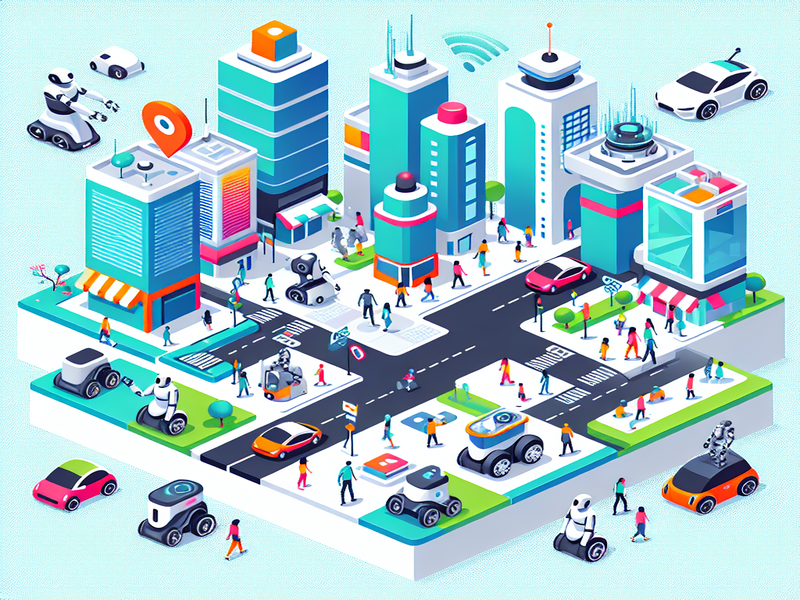- Updated: July 29, 2024
- 3 min read
NVIDIA Unveils fVDB Framework for Spatial Intelligence in Autonomous Vehicles and Robots
Introduction
In the rapidly evolving world of artificial intelligence (AI) and autonomous systems, spatial intelligence has emerged as a critical component. NVIDIA, a pioneering force in AI and graphics technology, has recently unveiled its groundbreaking fVDB framework, a deep-learning solution designed to enhance spatial intelligence in autonomous vehicles and robots. This cutting-edge framework represents a significant leap forward in enabling these systems to navigate and interact with the complex three-dimensional environments they operate in.
The Importance of Spatial Intelligence
As autonomous vehicles and robots become increasingly prevalent, their ability to perceive and understand their surroundings is paramount. Spatial intelligence, the capacity to comprehend and reason about spatial relationships and environments, is a crucial aspect of this capability. Without it, these systems would struggle to navigate intricate urban landscapes, avoid obstacles, and make informed decisions based on their spatial context.
The NVIDIA fVDB framework aims to address this challenge by providing a powerful tool for converting real-world data into highly detailed virtual environments. By leveraging techniques such as neural radiance fields (NeRFs) and lidar data, fVDB can generate massive, real-time rendered 3D environments that are essential for training AI systems to understand and navigate complex spatial environments.
Key Features of the fVDB Framework
The fVDB framework introduces several groundbreaking advancements that set it apart from previous models. One of its standout features is its ability to support spatial scales up to 4x larger than previous models, enabling the creation of vast virtual environments that accurately represent the real world.
Additionally, fVDB boasts a remarkable 3.5x increase in performance speed, allowing for more efficient training and deployment of AI models. This framework also excels in interoperability, seamlessly integrating extensive real-world datasets into full-sized 3D environments, enabling a more comprehensive and accurate representation of the physical world.
Another notable aspect of fVDB is its extensive set of operators, offering 10x more functionalities than earlier frameworks. By combining previously separate functionalities into a unified system, fVDB streamlines the process of creating and manipulating virtual environments, enhancing efficiency and productivity.

Potential Applications and Benefits
The applications of NVIDIA’s fVDB framework are far-reaching and extend beyond the realm of autonomous vehicles and robots. Urban planners can leverage this technology to create highly accurate digital twins of cities, enabling them to simulate and analyze various scenarios before implementing changes in the physical world. Similarly, climate scientists can use fVDB to model and study complex environmental phenomena, such as weather patterns and natural disasters, with unprecedented precision.
Moreover, the generative AI agents developed using fVDB can have a profound impact on industries ranging from manufacturing to healthcare. For instance, robots equipped with spatial intelligence could navigate complex factory floors, optimizing production processes and enhancing worker safety. In the medical field, AI-powered surgical robots could leverage fVDB’s capabilities to navigate intricate anatomical structures, enabling safer and more precise procedures.
Conclusion
NVIDIA’s fVDB framework represents a significant milestone in the pursuit of spatial intelligence for autonomous systems. By bridging the gap between the real and virtual worlds, this innovative technology empowers AI models with an unprecedented understanding of spatial environments. As the demand for autonomous vehicles, robots, and other AI-powered systems continues to grow, the fVDB framework positions NVIDIA at the forefront of this revolution, paving the way for a future where spatial intelligence is seamlessly integrated into our daily lives.
As the UBOS platform continues to evolve, it stands ready to embrace and integrate cutting-edge technologies like fVDB, enabling developers and businesses to harness the full potential of spatial intelligence and drive innovation across a multitude of industries.
